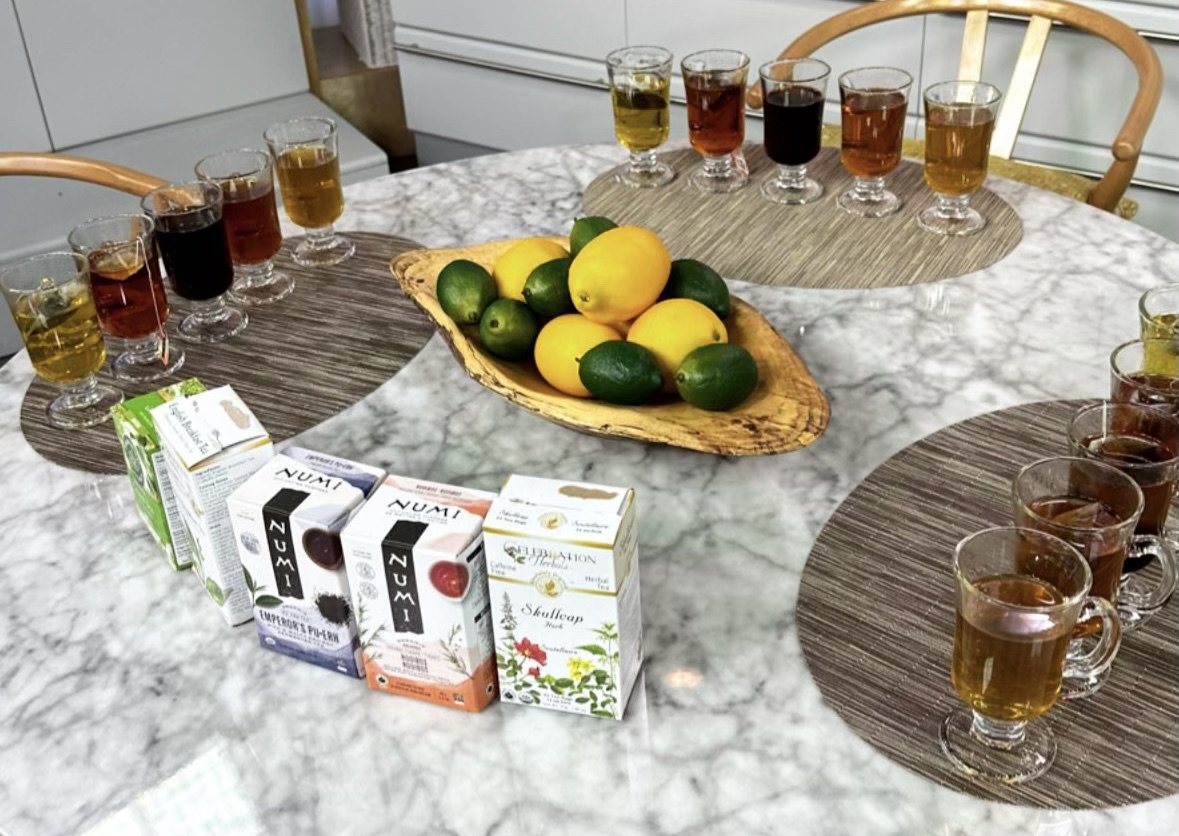Best teas for digestion, skin, anxiety & more!
I was never much of a tea person growing up. I thought it was weird watery coffee, and I truly didn’t get the appeal of drinking such nonsense. Harsh? Maybe. But I was a kid, cut me some slack (but, in your defense - I was a kid who said ‘such nonsense’, so maybe I do deserve a bit of a reality-check virtual slap in the face. Thanks for keeping me real, friend).
I started drinking green tea in my early twenties only when I heard that it could help you lose weight. So naturally, in my normal more-is-better fashion, I overdid it and would make a giant mammoth pitcher of green tea each day and it would be finished by sundown. Caffeine-content aside, there was actually nothing harmful about doing that. It was just a lot of tea. Still didn’t love the taste, but I would later find out that was because I continually oversteeped it (so wait you shouldn’t steep it for twenty minutes???). But the point was, I was slowly getting on the tea train.
It wasn’t until I got a job at David’s Tea a few years later that it finally clicked how great, versatile, and magical tea actually is. Remember David’s Tea? It was a Canadian chain that essentially made tea cool. All the kids went there. They had hundreds of tea options lining the wall - some really good for you, others not so much. Some were pure and organic, others were conventional and filled with artificial sweeteners and literal candy pieces. You could get a straight hot tea, and iced tea, or a sugared-up latte that would send your blood glucose levels flying. What a time to be alive! It also employed some of my favourite people in the world, and for that I’m grateful. Sadly, the chain closed their storefronts during the pandemic, but I believe they still have an online store.
I digress. Anyways, it was at that li’l tea store where I really started learning the nuances and benefits of different teas - white tea, green tea, oolong tea, rooibos and more. And I started collecting a whole assortment, and prescribing different teas to anyone who would listen. Tired but don’t want the jitters? Try Yerba Mate. Hungover? Have some rooibos. Anxious? Try this chamomile blend. This was before my time at nutrition school, but it really started the ball rolling on the whole ‘health-hacking’ concept.
And to this day, my cupboard is filled with an assortment of teas to fit any mood you might be in. And that’s why I love tea - there are so many options, with so many different benefits, that you really can have your own little tea pharmacy, ready to serve you when you need it.
So with that, I wanted to start highlighting the benefits of a few teas. I’ll most likely share more down the line, but I wanted to start with the basics, and throw in a couple you might not know along the way.
So without further ado, here are (some) of the health benefits of various teas!
Green Tea
When we think about “healthy tea”, we think of green tea. Annndd this is for good reason, it really is health-promoting. It’s high in antioxidants and specifically, green tea is high in something called Epigallocatechin Gallate (EPIGALLO -CATTAKIN - GALLATE) , or EGCG for short. This is one of the superstar compounds in green tea and can help reduce inflammation, support cardiovascular health, support weight management and it even has certain anti-cancer properties. (1)
To get the most health benefits out of green tea - don’t over-steep it (only 1-2 minutes ideally) and don’t use rapidly boiling water - I normally stop the kettle before it boils. If you’re a numbers person, aim for anywhere between 160-180 degrees Fahrenheit. And tastewise, if you do find your green tea too bitter, you can squeeze a bit of lemon in it, which will help cut the bitterness. Who knew!
Black Tea
There’s many varieties of black tea, but I’m talking about the general concept of black tea today. Black tea is made from the same starting leaf as green tea (called Camellia Sinensis) but the leaves have been oxidized and fired, which gives black tea that darker look. It has more caffeine than green tea, slightly less antioxidants because of its processing but it’s still really good for you.
Now personally - black tea isn't my favourite, but with that said - I do keep it on hand on the off chance that someone in the house has diarrhea. WHO knew I’d be going there in a tea article . . . but I like to keep you on your toes. Here’s the thing - the tannins in black tea have an astringent effect on the intestinal lining, and with that, it can help get things under control when it comes to the runs. (2) People also love black tea because of the taste. There, ended on a less gross note.
You can use boiling water for black tea, in my opinion just don’t steep it for longer than 3-5 minutes (unless you are doing it for the runs, in which case then do steep it for 15 minutes so it’s very very bitter).
Pu’erh Tea
Pu’Erh tea is one of my favourite teas. Pu’erh tea is a black tea, but the leaves undergo a unique fermentation and aging process that gives this tea a more mild, very distinct taste that I enjoy way more than regular black tea. Because this is a fermented black tea, it’s a fantastic drink when it comes to supporting our gut microbiome, digestion and helping to reduce bloat. It’s normally my go-to tea when it comes to bloat, and almost always provides relief.
The big drawback when it comes to pu’erh is the price - it’s almost double (if not more) the price of regular tea - so it’s best to have it once in a while, and opt for some of the other options we’ve discussed to have on the daily.
Rooibos Tea
Now for some caffeine-free options. Rooibos tea (pronounced roy-boss) is a naturally sweet tea, and is sometimes called “red tea” or “bush tea”. It comes from South Africa, and is known to be one of the highest antioxidant-rich teas in the world. And because of that, when I worked at the tea shop way back when, this would be people’s hangover tea because it was so nourishing and effective at helping people feel better. (This is of course, anecdotal evidence and not hangover science),
It’s also a great drink for your skin, and may help reduce the appearance of fine lines and wrinkles; some studies note this could be due to its anti-inflammatory effects on the skin. (3) This is more to do with topical-preparations than ingestion. But with that said - just to speak frankly and in my own words - free radicals do age us, and by consuming antioxidant-rich foods like rooibos, you do add in some free-radical fighters which can slow the damage done over the years. In my opinion. ;)
But skin or hangover or beyond - it is a nutritious tea. And best part, you can’t over-steep it!! Boiling boiling water is best with this, and the long the steep the sweeter it gets. And you can even re-steep it if that’s your jam! Win-win.
Skullcap Tea
Full disclosure - this one doesn’t taste that great, but it really does help when it comes to anxiety, and it’s actually normally an ingredient in sleepy-time teas. It’s made from the dried leaves and stems of the skullcap plant, which is native to North America. I love this tea for its calming, relaxing and sedative properties, and it’s used in the natural medicine realm to help relieve anxiety, stress and insomnia. It’s believed to work by increasing levels of the neurotransmitter GABA in the brain, which helps to reduce anxiety and promote relaxation. (4)
Whenever I’m dealing with racing thoughts at night, and they start to affect my ability to fall asleep, I’ll make a cup of skullcap to help lull me into a calmer state. Additionally, if there’s a presentation or interview that’s giving me the nerves, I’ll make a cup beforehand to help calm the jitters. And don’t worry - although I used the word ‘sedative’, it doesn’t knock you out when you drink it during the day. Time and place make an impact when it comes to consumption, as well as your overall energy as you drink it!
Boiling water works wonderfully for this tea, and steeping time can be anywhere from 5 to 15 minutes!
Lemon Balm Tea
If skullcap’s not your thing, but you want a better night’s sleep, lemon balm is another rockstar to consider. Lemon balm tea is well known for its calming effects on the body; it’s often used to alleviate stress, anxiety, and insomnia. Lemon balm has been used for centuries for its medicinal properties, and recent studies have confirmed its effectiveness in reducing anxiety and improving sleep quality. (5)
Bonus - it’s also known for its anti-inflammatory properties and is often used to alleviate symptoms of indigestion and menstrual cramps. SO! Lemon balm tea could be a great addition to your routine, or just a tea to have on hand for those times when you need a helping hand falling asleep.
I normally use boiling water for lemon balm, although some of my colleagues liked using just-before boiling similar to green tea.
Peppermint Tea
I can’t wrap up this post without talking about a tried and true staple - peppermint tea. I personally find this tea really calming but slightly energizing at the same time. If ever want to opt-out of coffee when catching up with a friend, but still want a little energetic flare, I’ll pick peppermint (I also keep peppermint essential oil on hand when I need an energy-whiff before a workout . . . try it and let me know if you like it).
In terms of health benefits, peppermint tea has been shown to help improve exercise performance (6), reduce symptoms of IBS (this is more so true of peppermint oil rather than the tea, but I have had clients report relief by drinking the tea alone), as well as having calming effects on the body. So it really is a superstar. I normally make a large pitcher of it and keep it in the fridge, especially during the summer months when it’s really hot out!
Like green tea, I normally use just-before boiling water for the tea, but you can steep it for as long as you’d like!
Final Thoughts
Despite being so opposed to it for half of my life, I’m a full tea-fanatic now. Mostly because it’s such an easy and affordable (depending on the tea) way to upgrade your health on the daily. And the more variety you slowly collect, the more magical options you’ll have ready to suit whatever mood you’re in, or itch you need scratched.
Scratch that itch my friend - cheers to a good cup o’tea!

